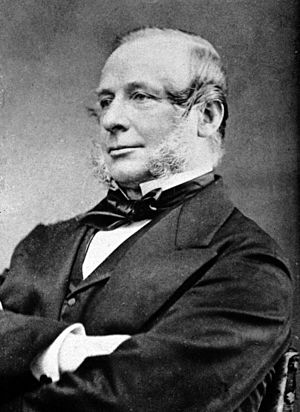Francis Sibson facts for kids
Francis Sibson FRS (21 May 1814 – 7 September 1876) was an English physician and anatomist.
Contents
Early life
He was born at Crosscanonby, near Maryport, Cumberland but grew up and was educated in Edinburgh, apprenticed to John Lizars, surgeon and anatomist, receiving his diploma (LRCS) in 1831. He treated cholera patients during the 1831–32 epidemic.
He continued his studies at Guy's and St Thomas's Hospital, London, qualifying licentiate of the Society of Apothecaries (LSA) in 1835. He accepted the post as resident surgeon and apothecary to the Nottingham General Hospital. In 1848 he returned to London and graduated MB and MD in the same year. He was elected a Fellow of the Royal Society in 1849.
Career
In 1851 he was appointed physician at St Mary's Hospital and lecturer at the medical school. Sibson was concerned to exhibit the internal organs of the human body in both healthy and diseased states: he was particularly interested in the physiology and pathology of the respiratory organs.
In 1862 he was appointed president of the Medical Society of London; from 1866 to 1869 Sibson served as president of the British Medical Association Council, and then later as vice-president for life.
He delivered the Goulstonian Lecture (1854), the Croonian Lecture (1870) and the Lumleian Lectures (1874) to the Royal College of Physicians
Private life
He married Sarah Mary Ouvry (1822–1898) in 1858. He died suddenly whilst on holiday at Geneva.
Suprapleural membrane is also known as "Sibson's fascia".
Death
He died at the Hôtel des Bergues, Geneva, on 7 September 1876.


